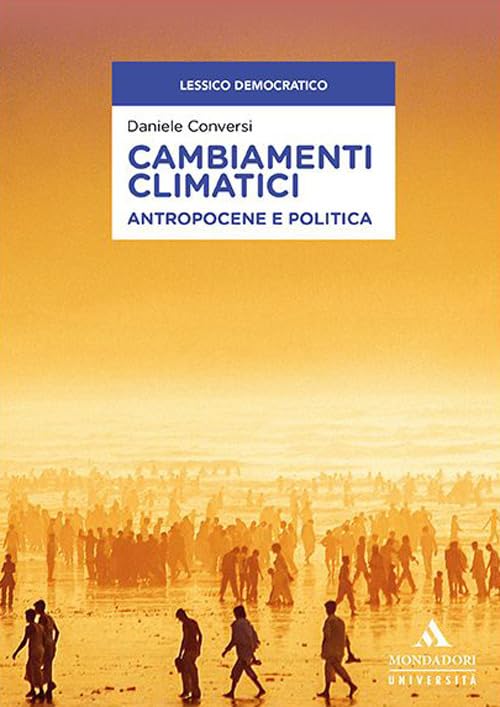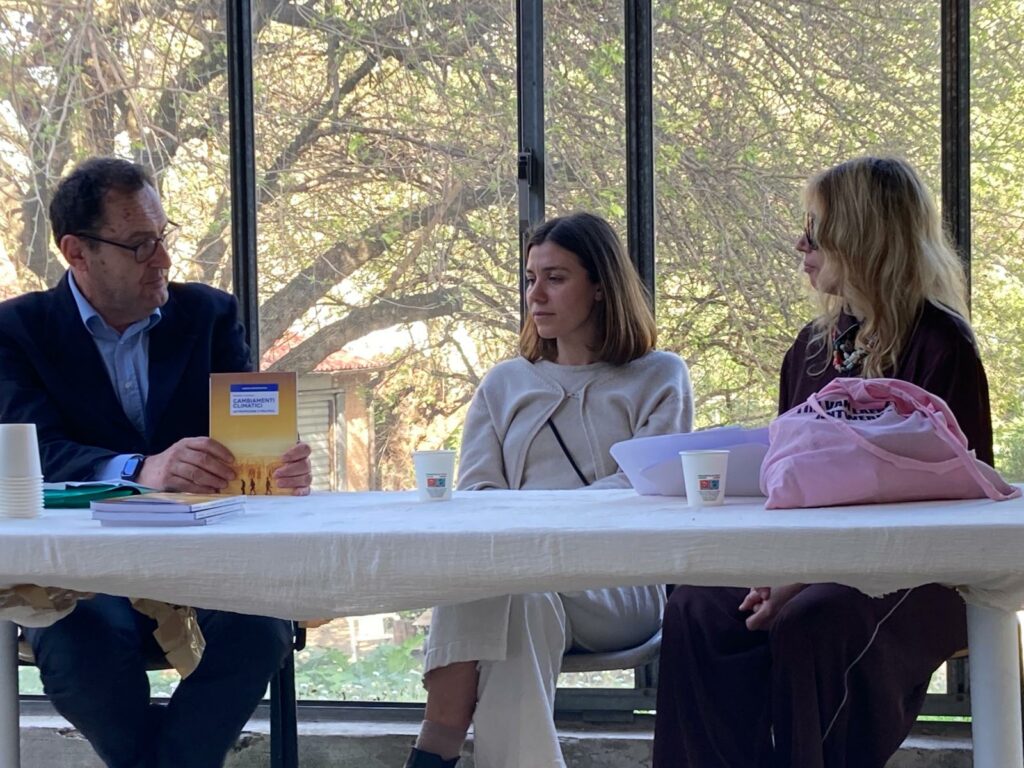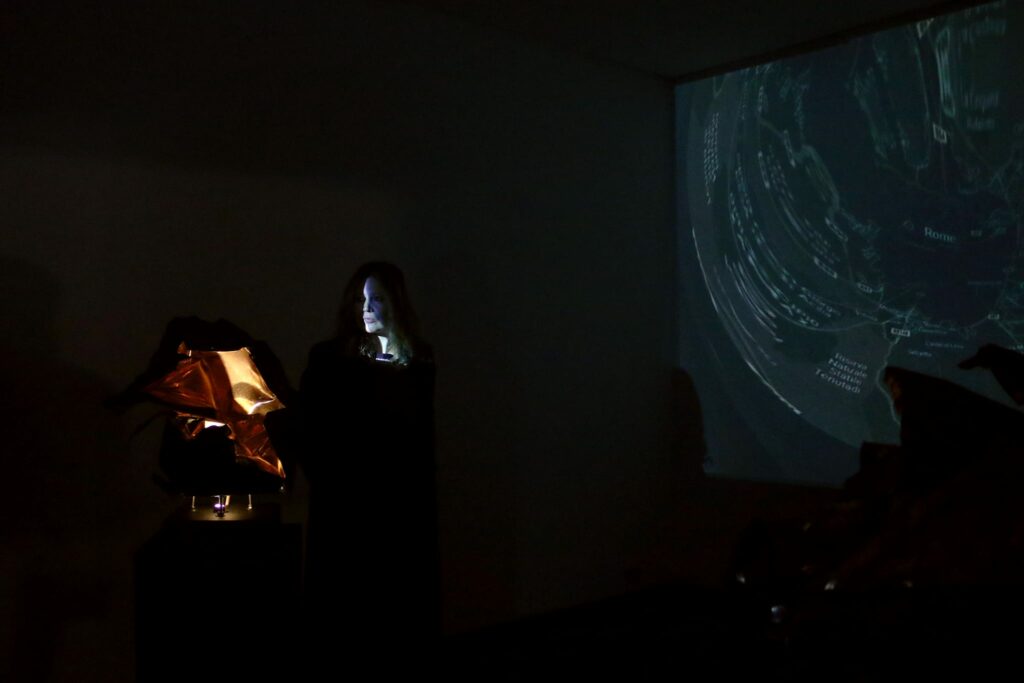The “Climate Change. Antropocene e politica” publication explores the conflictual relationship between the climate emergency and the geopolitical reality of nation-states, based on the ideology of nationalism.

In 2023, Mondadori in Lessico Democratico collection published the work of climate theorist Daniele Conversi. The volume can be a framework for developing new insights into political and economic relationships of power and how nations/institutions move in the crisis and the conflicts linked the climate change.
The crisis we are beginning to enter is an existential one in its fullest sense -not just in the way the existentialists meant it. It is a crisis concerning the very existence of every living being, a total crisis which affects every aspect of human and non-human life, including happiness, prosperity, love, psychology, human communications, war and peace– and the arts. A biotic crisis, which requires a shift from anthropocentrism to biocentrism. Science has been warning us since at least 50 years, when the watershed report by the Club of Rome on the “Limits to Growth” was first released (1972). Yet, a more extreme ideology seized power as the economic and power élites have gone in the opposite direction.
What are the various components of your cultural background and how did you become interested in climate change?
Both from my family and from my experience of long journeys across Europe, Asia and the USA.
What kind of journeys? Can you tell us about them?
In my early twenties, I traveled to Asia for over one year without ever taking a plane. In those days, it was possible to go very far by train, bus, donkey, motorcycle, van, and, even better, on foot. From Venice, I reached as far as the peaks of the Himalayas, bordering Tibet, crossing Eastward the Brahmaputra into Assam and down to Sri Lanka, just north of the Equator. Till there, for the entire route, I never ever saw an airplane. Many women and men were walking along the same route, feeling perfectly safe and confident all along the way. ‘Slow travel’ was a reality rather than a buzzword.
Today, such an adventure would no longer be possible: large, new asphalted roads have been built for cars and trucks, but many other connections are interrupted, defective or dangerous. Like in most European countries, slow travel has been discouraged and abandoned since the 1980s -despite experiencing a niche resurgence. At the same time, climate change has begun to hit indiscriminately a large amount of communities, areas and regions situated along my eastward path, such as in Assam, Northeast India.
Urban India has become a conglomerate/mass of noise, pollution, rush, aggressiveness.
After the mid-70s, the idea that there were Limits to Growth began to be explored and known — climate change had already been identified as one of the potential threats looming on the horizon. I’ve grown up in a home were science and the arts met (or perhaps clashed). My father, the nuclear physicist Marcello Conversi was part of “the boys of via Giulia” whose experiment on the muon was identified as the “start of modern particle physics” by Nobel laureate Luis Walter Alvarez. My mother, Elena Lacava, was an artist and later a gallery owner.
What are European governments doing about climate change? Or, rather, what are they avoiding to do?
Slowly, the European Union has been implementing a green energy transition which may not be ambitious enough, but travels further than most other countries in the world. Thanks mostly to the switch to renewable power, EU emissions fell by 8% in 2023 . Yet, many rightwing governments and parties, increasingly sold out to fossil fuels interests, have begun hampering, obstructing, and delaying most necessary actions, while organising massive disinformation campaigns. All along this trend, nationalism has become the most commonly used tool to capture the popular vote, seize power and sabotage all progresses made towards a safer word. This is the geopolitical prison I’m speaking about in my book.
What do you mean by the “geopolitical prison”? Nations are increasingly characterized by growing nationalist feelings, just consider the most recent elections in the Netherlands and the Italian government. How can one approach the urgency of the climate crisis turning it into a vehicle for change?
It will never be an easy fight. Many governments are strictly linked to fossil fuels interests, the car, the cement industries, and other corporations massively emitting greenhouse gases. Fossil fuel industries began very early on to create think tanks and lobbies to spread disinformation and lie about climate change. Governments and corporations both use their grip on the media to create what may be described as the most subtle, coordinated and persistent form of mass disinformation ever experimented in human history – a disinformation which concerns all the basic aspects of our lives in the not so far future.
How is this reflected in our personal day-to-day experience?
Recent research has shown that those who experience distress are more likely to engage in collective climate action or more willing to do so, while they may benefit from resources to support mental health and climate engagement. The human mind can react to a sense of alarm by increasing its adrenaline levels and entering into a fight (or flight) mode. This can lead to action, particularly collective action. But in the current conditions, with stress mounting, and without a constant flow of crucial information about what we need to do (and about the very way climate change is rapidly evolving), we are stuck in between an impossible “fight or flight” choice, cast in a freezing position. While frozen, we are slowly losing touch with our inner energy that provides us the necessary force to react to events of such a magnitude. Paradoxically, we stop acting when it is most needed, when the crisis is rapidly spinning out of control. Freezing in these conditions leads us directly to inaction. The outcomes include mental illness ailments, from discomfort to desperation and depression. Procrastination (delay) and depression are deeply interlinked and, in the long run, they can eventually lead to insanity. This ice-frozen situation multiplies if we feel we’re living in a condition of mounting disinformation, repression, censorship, misinformation, and lack of communication.
Sometime the perception can be that we are lonely, insulated and incapable of moving or affecting any outcome. But we’re not/this is not the case, and we should rapidly make ourselves aware of our capacity. It’s not too late to act, even though it may soon be. The clock is ticking, we are now a few seconds to midnight- the end of it all.
Change can no longer be gradual, it will be radical in a way or another, willing or not, whether we ignore the threat or are fully dedicated to, and immersed into, action. So, why not choosing to be on the frontline of change by communicating, creating communities, and modifying our behavior? In principle, the change propelled by the climate emergency, whether voluntary or not, is in itself going to be radical enough to affect every aspect of life. And the earlier we change of our own will, the better for all of us. While irreversible change is approaching quickly, we can still choose whether we passively wait like lambs to the slaughter or ride change like a surfer on the wave. This can only be done if we rediscover 1000 lost healthy habits.
For instance, a very basic, you may say simplistic, idea: let’s dump our cars in the dustbin of history and stop reading media that advertise aggressive, nature-destroying SUVs. Yes, that may require a lot of previous changes, including efficient public transports, but let’s keep it well in mind as our goal. Such changes may be difficult and slow, but not impossible.
The Flood. Valencia and the story of a disaster foretold. What could have been done to help the population and what could be done in the future to understand in advance the dynamics of such invasive meteorological events? What is the role of governments and institutions in these climate disasters?
As many governments play the card of climate obstruction while maintaining their ties with the fossil fuels industry, we’d better start by acquiring new habits on our own now.
And, as tragedy after tragedy begins to strike the world, we also need to reinvent new cross-national solidarities, materially helping with our bare hands the communities struck by catastrophe – many more are going to be hit like Valencia was in October 2024: a few days earlier calamities struck in Brazil, in the Philippines, in Pakistan, in East Africa, in parts of the USA; the only certainty is that climate change will strike back again forcefully and pitilessly –maybe in one day, one month, one year, but not so far away in space and time. And, if you still don’t understand it, think that many of these changes are irreversible. We may be able to stop the worst, but there is a certain inertia in the climate physics and many things are not going to change back even if we achieve zero emission tomorrow. Yet, reaching net zero emission is a matter of life or death for the next generation.
The metaphor of the ‘boiled frog’ which was popularized by US vice-president Al Gore is the most pertinent.
It’s the metaphor of a group of frogs immersed in a large pot of cold water that is slowly heated until it boils, so that initially they do not realize that they are being boiled alive and, when they realize it, they do not have the strength to get out. This metaphor is a good representation of the torpor in which we find ourselves and from which we are called to collectively wake up. Al Gore Jr’s metaphor is still one of the most appropriate to describe the situation in which we are all immersed.
Global heating, incidentally, decreases our intellectual capabilities, slowly clouding our minds, bringing to the incapacitation of many rational faculties. It is not a coincidence that in those US states more affected by climate change, such as Florida and Texas, Republican governors have succeeded in imposing a kind of censorship on climate science, well beyond denial. Idiocracy could be an appropriate name for such kind of ostrich politics, as in the comic movie. But there is a better term: the notion of fossil fascism, developed by the Swedish human ecologist Andreas Malm, indicates a kind of governance working on the basis of lies and deception. as the crisis deepens, this is likely to multiply. Deception and mendaciousness are a characteristic shared with historical fascism, which emerged after WW1 –and as a consequence of it. But nowadays it mostly originates in the USA.
What collective actions can be taken? Can civil disobedience be a key approach to resistance?
Yes, it is a sine qua non, but not enough. Civil disobedience alone wouldn’t do the trick as many political regimes increasingly employ repression and tend to control the media, sometimes engaging in public censorship. Communication is crucial.
In chapter 4 of your book, devoted to ‘green nationalism’ you cite two interesting examples – Scotland and Catalonia. Granted autonomy within another state, they were able to show how speedily different actions can be applied. Can you talk about what they were able to accomplish from 2012 to now?
Green nationalism is as emerging concept where subnational regions pursue important environmental agendas, in part to assert their identity and governance capabilities (Joan). Two best known examples are Scotland and Catalonia.
Already by 2009, Scotland passed the Climate Change (Scotland) Act, one of the world’s most ambitious climate legislation at the time, becoming a leader in climate action and environmental stewardship.
In 2019, the Scotish Parliament amended the legislation to set a net-zero target by 2045—5 years ahead of the UK. Scotland also set the most ambitious interim targets within Europe. In terms of renewables, 97% of Scottish electricity was derived from renewable sources already in 2020, thanks to the abundance of onshore and offshore wind, leading globally in tidal energy innovation. Fully committed to phasing out petrol and diesel vehicles by 2030, the Scottish government has lavishly funded efficient public transport, besides electric vehicles (EVs) infrastructure, while investing in developing cycling and walking, as forms of “active ” transportation.
Demonstrating Political and Cultural Leadership in the green transition, Scotland was one of the first regions worldwide to declare a climate emergency in April 2019, increasing its international influence in climate policy.
Even more ambitious the Catalan panorama: In 2017, Catalonia passed the Catalan Climate Change Law, aiming to reduce emissions by 40% by 2030 and 80-95% by 2050 compared to 1990 levels, while adapting to the Mediterranean problems of drought, heatwaves, and biodiversity loss. The Barcelona Low Emission Zone (LEZ), launched in 2020, progressively restricted more polluting vehicles from entering the city, becoming fully active in July 2022, while electric buses and rail infrastructure have been expanded. Regional and local governments have launched conservation projects to protect Mediterranean forests and marine life, using reforestation and sustainable land management to absorb CO₂ and boost biodiversity. Biodiversity and Environmental Protection
There are so many other examples I could give you. Scotland and Wales were the first regions to declare a climate emergency in 2019. But not everywhere is the same, and the Basque Country has experienced up and downs in sustainable policies and green transition.
What kind of actions can communities and individuals take today?
As an individual, I can only speak of my personal experience: I travel by public transport, I avoid and nearly abolished flying (unfortunately, it has become an expensive choice), I happily reduce my consumption of food of animal origin, starting with beef, while I eat (and invite others to eat) organic or zero-mile foods, I abhor greedy and stingy consumerism such as black friday madness – in the communities I belong to and have always been part of my family, nothing is bought that is not absolutely essential, we, as an increasing number of people, don’t watch TV with its misleading advertising and my online time is limited to work and everything I can do to help others make “the leap”. Also, as long as my strength allows it, I always plan to move and walk, even avoiding the elevator. But what may seem like an effort to some, becomes for practitioners a joy of living freed from the thousand useless frills that suffocate our creativity, energy and impede our growth.
My battle is therefore not only political but cultural and of customs, I underline (without pointing the finger) the contradictions of colleagues who travel far and wide to make an act of presence in meetings and conferences that could easily be held online. Collectively, however, I am neither an influencer nor a political leader.

“Il Nostro futuro. L’ecosistema non è cosa semplice”, (Our future. The ecosystem is not a simple thing), Museo Orto Botanico in Rome, talk with Giulia Pompilj, Daniele Conversi and Camilla Boemio, March 2024, photo by Fabrizio Orsini.
Professor Daniele Conversi
Section Editor, Nations and Nationalism and Specialty Chief Editor, Frontiers in Political Science
Ikerbasque Foundation for Science
& Universidad del País Vasco/University of the Basque Country
Founder and Chair of the Nationalism and Climate Obstruction working group– Brown Climate Social Science Network
Daniele Conversi on Wikipedia
CODERED Alliance (member)
Centre for Studies of Climate Change Denialism (CEFORCED)
PEFR, Political Ecologies of the Far Right network
Società Italiana per lo Studio della Storia Contemporanea (SISSCO)

Photo portrait of Camilla Boemio taken by Gabriele Mizzoni.
Camilla Boemio is an internationally published author, curator, and member of the AICA (International Arts Critics) and IKT (International) based in Rome. Recently, she had curated Antonio Palmieri: TEN YEARS: BSR People 14 – 24 at British School at Rome (2024). The solo show by Palmieri, who over the course of ten years working at BSR has photographed the people who have passed through the academy, from fellows to staff, inventing characters and telling stories.
She co-curated with AAC Platform Stefano Cagol. The Bouvet Island at ETRU Museo Nazionale Etrusco di Villa Giulia (2024); and Saun Santipreecha: Performative Cities presented by Reisig and Taylor Contemporary at AOC F58 Galleria Bruno Lisi in Roma (2024).
In 2013, Boemio was the co-associate curator of PORTABLE NATION: Disappearance as Work in Progress – Approaches to Ecological Romanticism, the Maldives Pavilion at the 55th International Art Exhibition La Biennale di Venezia. In 2016, Boemio curated Diminished Capacity, the First Nigerian Pavilion at 15th International Architecture Exhibition Biennale. Boemio’s recent curatorial projects include her role as co-associate curator at Pera + Flora + Fauna. The Story of Indigenousness and The Ownership of History, an official collateral event at the 59th International Art Exhibition La Biennale di Venezia, which was commissioned by PORT and the state government of Perak, Malaysia, in 2022.
Invitations to speak include the Tate Liverpool, MUSE Science Museum, Pistoia Musei, Roma Museo Orto Botanico and the Cambridge Festival 2021 at Crassh in the UK.





















































